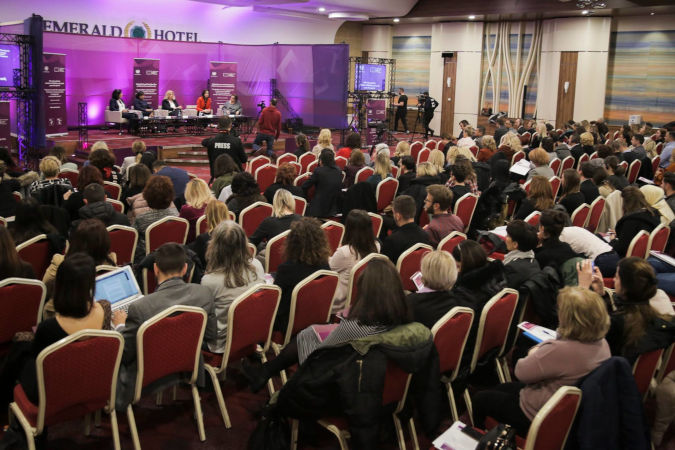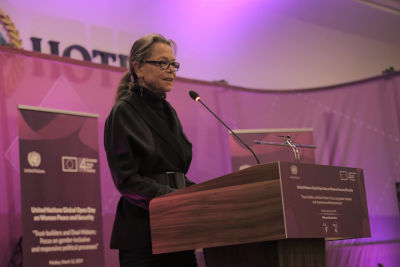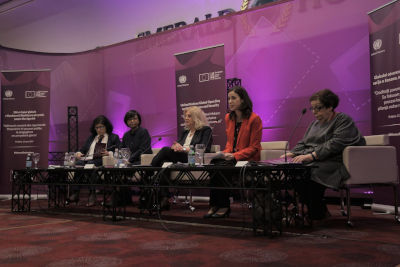For a lasting peace in Kosovo and the region, political processes need to be gender-inclusive
On the 2019 Global Open Day, at a joint UN-EU event, discussions centred on the need to increase the number of women actively involved in political processes across Kosovo and the region, strengthen implementation of laws on gender equality and consider the voices of survivors of conflict-related sexual violence.Date:

On 12 March in Pristina, the capital of Kosovo[1], participants to the Global Open Day on Women, Peace and Security discussed the urgent need to increase the number of women active across all levels of political and decision-making processes.
Over 250 representatives of political and civil society groups from Kosovo and across the Balkans attended the 2019 Global Open Day, jointly organized by the UN and the European Union (EU), which both look to further increase their collaboration to increase involvement of women in decision-making processes.
Titled, Trust-builders and deal-makers: Advancing the Women, Peace and Security Agenda in Kosovo, the 2019 Global Open Day included two panels, a televised debate, and vigorous Q&A between panellists and the audience.
After discussions on advancing gender-inclusive and responsive politics, participants recommended to effectively safeguard women’s representation and active participation in politics and ensure that all political processes represent women’s needs and priorities.
Panellists highlighted that women are under-represented in decision-making at all levels in Kosovo and the region and that their participation is vital to effective, sustainable peace and post-conflict recovery.

“Gender equality is not only a fundamental human right, it is also a necessary foundation for a just and peaceful world,” said Ulrika Richardson, UN Development Coordinator for Kosovo, who pointed out studies showing that women’s active participation in peace processes increased by 35 per cent the likelihood of a lasting peace agreement.
Women’s full participation in politics and peace is critical to democracy, panellists noted. “Integrating a gender perspective into all politics and women’s full, equal political participation are key democratic requirements,” stressed Ambassador Nataliya Apostolova, Head of the EU Office in Kosovo and EU Special Representative.
Women’s limited participation in political negotiations and decision-making in Kosovo and the region had serious implications for peace, one panellist emphasized. “A lasting peace cannot be achieved and sustained unless it is carried out at the highest institutional level and includes women’s needs and priorities,” stated Mexhide Mjaku Topalli, Member of the Assembly of Kosovo and Chair of the Women’s Caucus.

The work of the Regional Women’s Lobby of South Eastern Europe (RWL SEE), supported by UN Women, was put forward as a prime example of a powerful network continuously advocating for women’s meaningful participation in contributing to peace and security in the Western Balkans and beyond.
Drawing on global and regional experience, panelists stressed the critical need for women to be fully engaged in all tracks and levels of political processes. “Women must be protagonists. A society cannot advance if women’s strategic capital is not used to serve peace, security and democracy,” said Edita Tahiri, RWL SEE Chair and former chief negotiator for the Pristina-Belgrade Dialogue.
Ms. Sonja Licht, President of the Belgrade Fund for Political Excellence, highlighted that issues linked to poverty, such as property rights, economic participation and gender-based violence, need to be addressed urgently in order for women to build a major constituency.
Global Open Days was launched by the UN in 2010 to review the implementation of UN Security Council Resolution (UNSCR) 1325 on Women, Peace and Security. Held worldwide, Global Open Day allows women to discuss their efforts to promote peace and security and propose changes to policy and legislation.
[1] All references to Kosovo on this website shall be understood to be in full compliance with UN Security Council Resolution 1244 (1999).